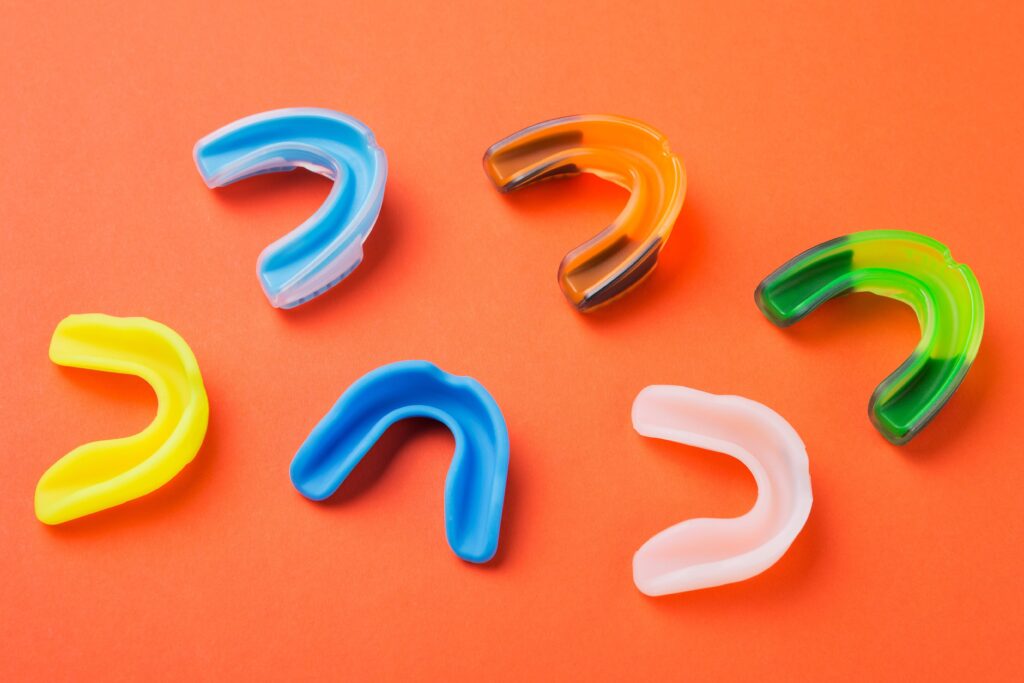Bruxism is fairly prevalent, and it can be difficult and uncomfortable to deal with. Additionally, it occasionally poses a serious threat to teeth. You might be experiencing the impacts of chronic teeth clenching if you frequently experience weariness brought on by disturbed sleep patterns, dull headaches, jaw soreness, or facial pain.
Although there isn’t a single explanation for teeth clenching, stress and worry are the main causes. Smoking, sleep apnea, and alcohol can all contribute to this condition. To help you deal with the problem, there are many sorts of night mouthguards available. You can talk to our dentist in Spruce Grove to know more. Which personalized night guard should you order before your upcoming trip to bed in an effort to reduce teeth clenching?
Types of Night Guards
-
Over-the-counter
Over-the-counter night guards in Spruce Grove are available on the shelves of your neighborhood pharmacy or sporting goods store. Typically, these come in boil-and-bite or one-size-fits-all stock guard varieties. Because they are not manufactured with sturdy materials, they are inexpensive. They won’t be effective for serious grinders because the materials will degrade quickly. Since they were designed for contact sports, these guards are better suited for those activities.
-
Custom-fit
Custom-made night watchmen provide a more individualized option. These dental night guards are available from dental offices as well as online merchants like Pro Teeth Guard. They are created in a skilled lab using the wearer’s mouth imprint. These guards are custom-made for you, utilizing high-quality materials and methods. They are, therefore, frequently more comfortable and robust. Additionally, custom night guards are available in a variety of materials, so you may pick the one that best suits your requirements.
-
Flat plane occlusal
Bite guards and flat splints are other names for flat-plane occlusal guards. People who experience bruxism or TMD because of malocclusion, or a poor bite, are typically advised to use this type of mouthguard. A flat surface can be used to create custom-fitted guards, allowing the teeth to effortlessly glide down the surface rather than rubbing up against one another. These guard against harm from teeth grinding to both the upper and lower teeth. Flat plane guards may also be suggested as a TMD treatment since they might promote jaw relaxation and reduce excessive jaw muscle activity.
Benefits of Night Guards
When participating in athletic endeavors and contact sports, using a mouthguard can help you avoid:
- Broken teeth.
- Cracked teeth.
- Harm to the pulp in your teeth.
- Soft tissue damage to your inside cheeks, lips, and gums.
By using a mouth guard while you sleep, you can lessen your risk of developing:
- Wear and damage brought on by teeth grinding or clenching
- Snoring.
- TMD problem symptoms include pain in the jaw, head, face, and other areas.
- Sleep apnea and associated issues, such as hypertension and daily weariness.
How to Choose the Right Night Guard for You
- Consult a dentist near you to assess your unique requirements.
- Find out what you need specifically, such as if you grind your teeth or have TMJ dysfunction.
- Think about the three different kinds of night watchmen: stock, boil-and-bite, and custom.
- Although stock guards are cheap, there is little room for personalization.
- Guards that boil and bite fit more comfortably than stock guards.
- The most individualized guards are created to order, and they provide the best protection and fit.
- When deciding what to buy, take your budget, comfort, and durability into account.
Frequently Asked Questions
1. Can I wear a night guard during the day?
Yes, wearing sleep guards could prevent damage to your teeth if you grind and clench your teeth to a severe degree.
2. How long does a night guard last?
Depending on a variety of variables, the durability of night guards near you will vary. A night guard has a lifespan of five years on average, but depending on wear, it may need to be replaced in just one.
3. How often should I clean my night guard?
After removing your night guard from your mouth after each use, you should rinse it with warm water. This will clear the night guard of debris and dislodge any plaque that may be there. After rinsing, lightly brush your night guard with your regular toothbrush.
4. Is it okay to use an over-the-counter night guard?
It may be preferable to use an over-the-counter mouth guard to protect your teeth from damage or grinding than to provide no protection at all. However, since OTC mouthguards are not custom-fitted, if you move your jaw while you sleep and the mouthguard comes off, your teeth are no longer shielded.
5. Can a night guard cause any side effects?
Your dentist will be able to replace your night guard if it is causing you any pain, irritation, or discomfort. Other possible adverse outcomes include shifting teeth, jaw pain or misalignment, and soreness, poor fit, pressure, or pain.
For more information, please come into Queen Street Dental today!

